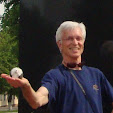I'm working with a life coach to help me set goals and get things done. We're early in the process, but I'm making good progress. Among other things, I'm finally working once again on the memoir I started writing altogether too long ago. (I'm compiling travel stories and life lessons from notes my first wife and I made during our years together.) Today I re-worked a story from the bottom of Copper Canyon in Mexico, in 1998. I think you'll enjoy this excerpt:
It all started out ordinarily enough, as a walk to Cerro Colorado. We knew the village from the year before, but Jim had ideas to add some features to the trip. To get a good start on the day, we had the rhythm guitarist drive us to the end of the aqueduct, where we picked up the trail to Cerro Colorado. The first part of the trip was as we remembered; beautiful and not too hard. We saw again the mill for the gold mine in operation, jumped rocks across the stream from time to time, and crossed the swing bridge into the town. We sat for a while with Ofelia's family. Jim hoped someone would be driving back to Batopilas later in the afternoon, so that we could spend our time going further upstream to a Tarahumara village rather than hike back to the hotel. Our host thought that for 300 pesos, he could find us a driver. I objected that this seemed high, though Jim thought it was about right. Since he really wanted to travel that way, he offered to split the cost with us. In the end, when we understood how long and hard the trip was by car, we agreed that the price was reasonable but the hotel ended up picking up the tab for all of us. I think they were glad to get us back alive.
Freed then from the walk back, we began an extremely beautiful and very difficult two-hour hike up the river to the remote village. We walked atop a one-foot-wide stone-wall aqueduct for quite a while. As you know, this sort of thing wasn’t among Luci’s strengths, and she avoided looking down because she didn’t want to think about how far she’d drop if she fell. I judged that occasionally the drops would have been well over one story: farther than either of us wanted to jump. Most of the hike, fortunately, followed more traditional, ever-rocky Copper Canyon trails. In one place, we walked through a refreshing stream in lieu of passing around handholds over a large rock.
The village center at Munerachi consisted of an old locked-up adobe mission, plastic Quonset hut class rooms, a dormitory, and a very few other buildings. Around us, and up on the cliffs, we could see the families' ranches. We walked into one of the classrooms, in session, to give the teacher the pens Luci had brought as gifts. We delighted at a roomful of beautiful faces, the students all sitting at traditional desks working at math and Spanish.
We didn't have enough time to stay. Our ride back was supposed to leave Cerro Colorado at 5:00, so we came back along the beautiful canyon, happily finding alternative paths in several places, minimizing the time spent on the aqueduct on the way back. Tired, Luci thought the aqueduct looked a lot scarier the second time.
We made it back to Cerro on time, but our driver was not there. We visited Ofelia's family again, chatting and waiting. A violent screeching of pigs interrupted our conversation. Pigs and piglets roamed freely in the town, and we imagined that a fight had erupted among them. Going outside to look, we found a guy tying up two big ones. Luci feared that we’d have to stand there and watch them get slaughtered, but instead men loaded them into the back of a truck; the very truck we would be taking to Batopilas. Jim and a local guy stood in the back with the pigs. The two of us got in the front with the driver, who was drinking the local beer. Judging by the flood of urine when we stopped along the way, I'd say he'd already enjoyed LOTS of it, though I managed to restrict him to two cans during the drive.
Then we began very slowly to navigate the terrifying dirt road back down the canyon to Batopilas. We stopped several times along the way. At one point our driver purchased a bottle of homemade brew called lechugilla, from a fellow riding his horse more or less along our route. The liquor was in an old whiskey bottle, sealed with a corncob. Lechugilla is a type of agave that only grows in this part of Mexico, so we understood the beverage to be some sort of homemade tequila. Erasmo, the driver, offered us a drink but we declined and set the bottle on the floor, out of his reach.
In spite of, or perhaps because of, any alcohol-induced impairment, Erasmo drove the curves very carefully. Some of them were so tight he had to back up and reposition to edge the truck around in the space available. We jostled back and forth down the canyon wall, fording a stream seven times as we worked our way to Batopilas. I kept Erasmo engaged in conversation as best I could, because he drank less while he was talking. It would have been a scary ride even with a great driver in a new vehicle.
We didn't get to the inn in time to hear the ranchero music before dinner, but we still sneaked off to take a bath before arriving a few minutes late for the meal itself. Nobody would have wanted to sit with us without the bath anyway.










